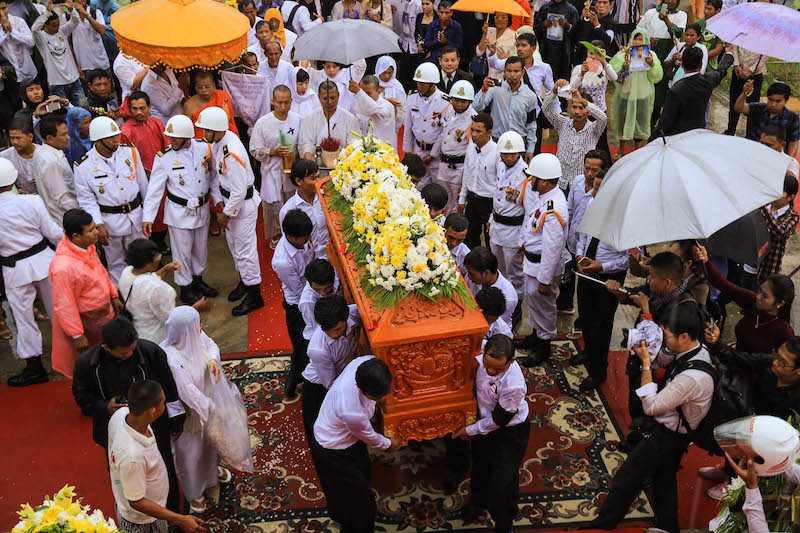The body of Pen Sovann, who was the country’s first prime minister after the Khmer Rouge and died as an opposition lawmaker, was cremated at a pagoda on the outskirts of Phnom Penh on Sunday at a ceremony presided over by prominent opposition figures.
Pen Sovann’s coffin was set alight by Son Soubert, a politician and scholar whose father, Son Soubert, was a leader of the resistance against the Phnom Penh government that replaced Pol Pot.

Pol Ham and Eng Chhay Eang, senior lawmakers for the CNRP, delivered speeches to a crowd of about 500 of Pen Sovann’s friends, family and supporters gathered at Wat Russei Sanh in Dangkao district.
Mr. Ham said that he first met Pen Sovann when they became founding members of the Human Rights Party in 2007, joining forces with opposition leader Kem Sokha.
“Before I ever met him, we just heard that he was a leader who liberated the Khmer nation from the Khmer Rouge and, based on his speeches, he was a nationalist even though he lived in Vietnam for many years,” Mr. Ham said.
“I think he was a part of maintaining a pattern of patriotism for the next generation of youth.”
Having been part of the communist movement that gave rise to the Khmer Rouge, Pen Sovann fled to Vietnam in 1974 out of fear for his life and worked to bring together Cambodian rebels who would join Vietnamese forces in ousting the regime from power in January 1979. He was made prime minister of the new Vietnamese-backed regime in 1981, but within months was removed and jailed in Vietnam for efforts to resist Hanoi’s control.
Though many see him as a “father” of the forces who finally took down Pol Pot, the ruling CPP has sought to portray him as a “narrow-minded” leader who prioritized Cambodian sovereignty over defending the new regime against the continued threat posed by Khmer Rouge guerillas and other forces fighting to overthrow it.
Mr. Chhay Eang said that the beliefs that saw him quickly removed as prime minister were proof of his patriotism.
“For being honest and committed to the interests of the nation, he made leaders of Vietnam unhappy with him. He did not support the flow of thousands of Vietnamese families into Cambodia’s 24 provinces. He was also against cutting Khmer land along the border and making it Vietnamese land,” he said, citing criticisms that are often repeated by the CNRP.
The government rejected requests for Pen Sovann’s cremation to be held in the central Wat Botum park, explaining that only serving senior government leaders are eligible for such public ceremonies.
Kem Than, 65, a friend of Pen Sovann since the 1990s, said that the location of the ceremony did no justice to a man so important to Cambodia’s history.
“It was not suitable for him that he sacrificed his whole life for the nation and was cremated near Prey Sar,” she said of the city’s largest prison. “He is dead now, but his bravery and dignity are not, unlike some uneducated people who have played down bad things to become good things and white to become black.”